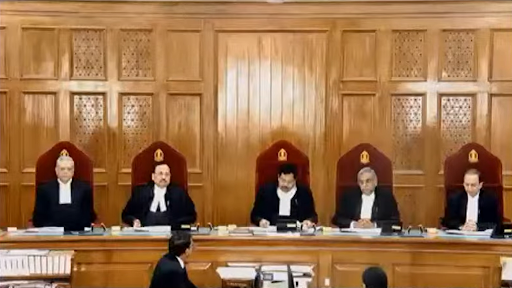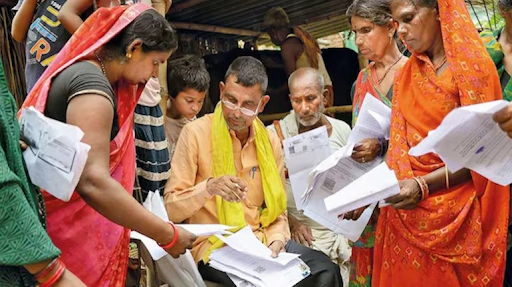



The Supreme Court held that courts cannot fix binding timelines for Presidents or Governors to clear bills, citing separation of powers and Article 361 immunity. It warned that indefinite delays undermine legislative intent and urged constitutional dialogue over obstruction, placing responsibility on political norms and conventions.

Copyright infringement not intended
Picture Courtesy: THE HINDU
The Supreme Court's Constitution Bench stated that the judiciary cannot impose binding timelines on the President or a Governor for granting assent to bills.
|
Read all about: Supreme Court Fix Deadlines for Governors l can judiciary review inaction of governors on bills? l About Sanity to Constitutional System |
A five-judge Constitution Bench, headed by Chief Justice of India, held that the judiciary cannot impose binding timelines on the President or a Governor for granting assent to bills.
It clarified that Articles 200 (Governor's assent) and 201 (President's consideration of reserved bills) are designed to allow "elasticity" for constitutional authorities.
|
Background of the Issue Earlier Two-Judge Bench Verdict (April 2025):
Presidential Reference (Article 143):
Purpose of Advisory Opinion: The Presidential Reference sought an authoritative opinion from a larger bench to resolve the "state of confusion and doubt" created by the earlier ruling. |

Article 111 (President's Assent to Parliamentary Bills):
Article 200 (Governor's Assent to State Bills):
Discretionary Power: The Governor enjoys discretion in choosing among these options and is not bound by the "aid and advice" of the Council of Ministers in this specific function.
Article 201 (Bills Reserved for President's Consideration):
Constitutional Design and Elasticity
The Court noted that Articles 200 and 201 are "framed to allow elasticity" and imposing rigid timelines would be "strictly contrary to the Constitution."
Separation of Powers
Prescribing timelines would amount to judicial overreach and rewrite the Constitution, thus violating the doctrine of separation of powers, which is part of the basic structure.
"Deemed Assent" Unconstitutional
The Court rejected the concept of "deemed assent" (bills automatically becoming law after a certain period of inaction).
Non-Justiciability of Merits
The Court held that the Governor's or President's actions under Articles 200 and 201 are generally "non-justiciable." Courts cannot examine a bill's contents or review the decision (assent, withhold, or reserve) before it becomes law.
Limited Judicial Review for Inaction
The Court clarified that "prolonged, unexplained and indefinite inaction" by a Governor that hinders the legislative process is subject to "limited judicial scrutiny."
Article 361 (Governor's Immunity)
Article 361 grants the Governor personal immunity from judicial proceedings, but the Court held this cannot excuse indefinite delays or nullify limited judicial review of the constitutional office.
President's Discretion under Article 201
The President's decision to assent or withhold assent from a state bill reserved under Article 201 is not open to judicial review on its merits.
Upholding Constitutional Architecture
The ruling upholds the constitutional separation of powers, confirming the intended roles of the President and Governors as per the framers.
Balance of Power
It upholds the Governor's discretion (Art 200) and the President's powers (Art 111, 201), avoiding judicial takeover of executive roles.
Cooperative Federalism
Governors must resolve bill differences with elected legislatures through dialogue, not obstruction, as indefinite delays negate the people's will expressed by the legislature.
"Pocket Veto by Inaction: Governors/President can indefinitely delay a bill, acting as a "pocket veto" due to the lack of a constitutional timeline.
Against Legislative Will: Indefinite delays undermine the democratic process and the will of state legislatures.
Federalism Concerns: The discretionary power of the Governor, a Union appointee, over state legislation raises concerns about federal balance.
Lack of Accountability: Without clear timelines or accountability, assent delays can appear arbitrary or politically motivated.
Ambiguity in "As Soon As Possible": The constitutional phrase "as soon as possible" (Article 200) lacks a precise definition, leading to misuse and varied interpretations.
Institutional Dialogue: The Supreme Court advocated for a "dialogue process" between Governors and state legislatures to iron out differences.
Codification of Conventions: Developing stronger constitutional conventions or guidelines regarding the reasonable timeframe for Governors/President to act on bills.
Constitutional Amendment (Legislative Route): Parliament should amend Articles 111, 200, and 201 to introduce specific, reasonable timelines for assent, similar to provisions in some other democracies like the USA.
Inter-State Council: Strengthening bodies like the Inter-State Council to discuss and resolve issues related to the Governor's role and assent to bills.
Implementing Sarkaria and Punchhi Commission Recommendations
Case-by-Case Judicial Intervention: The Court's current stance allows for intervention in cases of "prolonged, unexplained and indefinite inaction," which acts as a check without imposing universal timelines.
The Supreme Court ruled that the judiciary cannot impose binding timelines on the President or Governors for bill assent due to the separation of powers and constitutional immunity (Article 361), yet it cautioned that indefinite delay is impermissible, urging constitutional dialogue instead of obstruction.
Source: THEHINDU
|
PRACTICE QUESTION Q. Critically analyze the Supreme Court's stance that constitutional authorities like Governors cannot be bound by judicial timelines for deciding on bills. 150 words |
The Supreme Court cannot set a deadline due to two main principles: 1) The Doctrine of Separation of Powers, which prevents the judiciary from encroaching on the executive's constitutional functions, and 2) Article 361 of the Constitution, which grants personal immunity to the Governor from being answerable to any court for the exercise of their official powers.
Under Article 200, the Governor can:
If the State Legislature passes the bill again, with or without the amendments suggested by the Governor, and presents it for assent, the Governor is constitutionally bound to grant assent. They cannot withhold assent or return it a second time, though the option to reserve it for the President may still be available.



© 2026 iasgyan. All right reserved